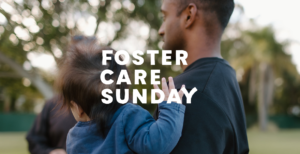Supporting carers: Ideas to come alongside for the journey
There are so many ways that you can play a supportive role in the lives of carers who you know. They have chosen to step into a unique role that is not without its challenges.
If you know a Foster Carer, Kinship Carer, Permanent Carer or Guardian, or Adoptive parent, these are some ideas for how you might come alongside them for the journey.
Prayer.
- Pray with and for the carers in your world.
- Ask them what they would appreciate prayer for and how they’d like you to pray for them.
- Find out if they are happy for your church to pray for them, ensuring confidentiality where desired and required.
- Pray for the children in their care (recognising it is unlikely to be ok to pray directly with them).
Understanding.
- Understand that the journey might be really tough. It’s not your place to give advice, but to hold space and listen.
- Remember that listening doesn’t require knowing all the information. There are things a carer won’t be able to share with you. Don’t probe with questions about the stories of the children in their care and respect where there is a need for confidentiality.
- Commit to an ongoing learning journey. Explore the resources on our website and equip yourself to grow in understanding.
- Respect that kids from hard places might have different behaviours and that there are different approaches to parenting. Support carers in their efforts to provide trauma-informed, attachment-focused care for their kids.
- Learn children’s names but don’t use them or share photographs on social media or in public forums.
Relationship.
- Be a friend. It’s often very simple things that can go a long way towards carers feeling seen and supported.
- Invest time to enable genuine relationship to develop. Check in regularly.
- Be a listening ear. Surprise them with a gift. Sit with them in church. Invite them around to your place.
- Keep track of significant events such as court dates, birth family visits, the end of a placement, or the beginning of a new one.
- Remain flexible, recognising that there are unknowns that come with the role of a carer.
- Remember to support the whole family, taking your lead from the carer when it comes to connecting with the child in care, and remember to support biological children too.
Encouragement.
- Let them know you recognise and honour the role they’re playing.
- Send an encouraging text.
- Celebrate successes, even the small ones.
- Your role is to encourage, not fix any challenges.
- Be a listening ear for carers to vent when they need to but don’t initiate speaking negatively of people or the system.
- Acknowledge the struggle while holding onto hope.
Practical support.
What things can you do to help free up time and energy for carers to focus on what they do best – caring for the children in their home who often need a lot of focused time and attention?
Here are some ideas:
- Deliver a meal or give a food delivery voucher (check any dietary requirements or preferences).
- Find out the family’s busiest day of the week and make or order a meal for that day.
- Do the groceries or run errands.
- Ask for a grocery list or pick up their online grocery order.
- If you’re out running errands, check in and see if they need anything.
- Help with school or day care drop off/pick up.
- Provide home help on a regular basis (washing, ironing, meal prep, housework)
- Offer to pick up/drop off some ironing, or clean the house while they’re out.
- Do a fortnightly tidy-up of the garden and yard.
- Provide an extra pair of hands to help with morning or evening routines.
- Find out the busiest time of day and offer to help with the other kids while the carer works intentionally with the child(ren) in care to establish connection and new rhythms.
- Support biological children e.g. homework, playing, scheduled activities.
- Visit to play with a younger child with the carer is helping an older child with homework.
- Support birth children especially during times of transition; they might appreciate a day out.
- Offer to play with the kids for an hour or two and let the carer have a bit of time to themselves.
- Send mum and dad on a date night (remember to check babysitting rules with the Case Manager)
- Provide practical items needed prior to a first placement and ongoing.
- What type of placement(s) will they be receiving – age, gender, etc.?
- What items might be helpful e.g. nappies, spare clothes, pram, toys, skateboard, PlayStation, spare laptop, etc.
Here are some key things to keep in mind when seeking to provide support.
Be SPECIFIC:
Every family is unique. The type of support that is useful will depend on the carer, the kids or young people in their care, other available support, personality, capacity, and schedule. Don’t assume that what is helpful for one family will be helpful for another.
“What do you need?” can be a hard question to answer. Try proposing some ideas to get a sense of what might suit them.
Be specific but remain flexible. Foster Care can be unpredictable, and every family goes through different seasons and changes. Be willing to adapt along the way.
Be PERSISTENT & CONSISTENT:
Ask. Then ask again. The trick can sometimes be in carers accepting support but be persistent, while remaining sensitive and not overly intrusive.
Never give up. Carers are committed to their children for as long as they need a home and permanent carers or adoptive parents are committed to building a forever family for their child, faithfully loving them even when it’s hard. Stick with them every step of the way, helping to provide stability.
Be SAFE:
It’s important to be mindful that there are some parameters regarding appropriate types of support for children in out-of-home care. Sometimes ideas like babysitting or helping at bath or bedtime aren’t suitable but there are many other ways you can provide practical support.
Carers should ensure the Case Manager is aware of any plans re. another adult’s direct involvement with a child in care and obtain clearances and approval as required.
Carers might be interested in the Wrap-around Team resources, to help them build a holistic support system for the journey. Find out more at the link below.
If you want to dive deeper into providing holistic wrap-around support for carers, or if you are part of a church that is wanting to support carers within your church community, check out the Caring for Carers guide.








